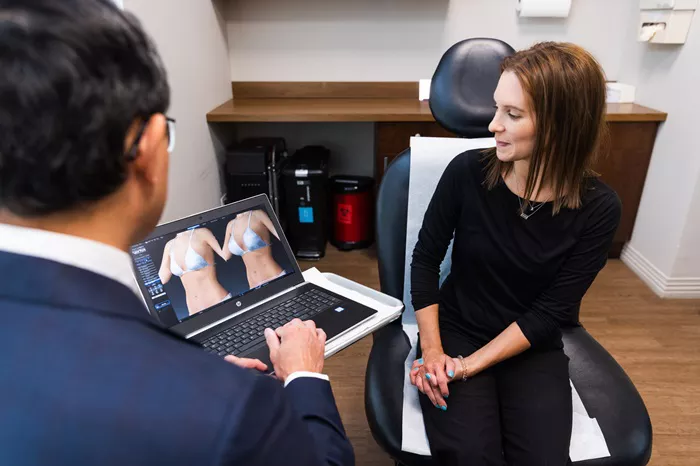Redoing breast implants, also known as breast implant revision surgery, is a significant procedure many women consider for various reasons. Whether it’s due to complications, dissatisfaction with the initial results, or changes in personal preferences, understanding the costs involved is crucial for anyone considering this surgery. This article provides a comprehensive look at the factors affecting the cost of redoing breast implants.
Understanding Breast Implant Revision Surgery
Reasons for Revision Surgery
Many women opt for breast implant revision surgery for various reasons. Some common reasons include:
Implant complications: Issues like capsular contracture, implant rupture, or shifting may necessitate revision surgery.
Cosmetic dissatisfaction: Changes in body shape, weight fluctuations, or simply a desire for a different size or shape can prompt revision.
Aging implants: Over time, implants may need to be replaced due to wear and tear.
Types of Procedures
There are different types of revision surgeries depending on the patient’s needs:
Implant replacement: Switching out old implants for new ones, which could be of a different size or type.
Capsulectomy: Removing scar tissue that has formed around the implant.
Breast lift: Combining implant replacement with a lift to achieve the desired aesthetic.
Factors Affecting the Cost
Surgeon’s Expertise
One of the most significant cost factors is the surgeon’s expertise. Highly experienced and board-certified surgeons tend to charge more for their services. Their extensive training and successful track record justify the higher fees.
Geographical Location
The cost of living and the average price for medical procedures in different regions can significantly influence the cost. Major cities and urban areas typically have higher costs compared to rural locations.
Type of Implants
The type of implants used (silicone vs. saline) can also affect the cost. Silicone implants are generally more expensive than saline implants due to their composition and the complex manufacturing process.
Surgical Facility
The choice of surgical facility, whether it’s a hospital or an outpatient surgical center, also impacts the cost. Hospitals usually have higher fees due to the comprehensive services they provide.
Anesthesia Fees
Anesthesia is a critical part of any surgery, and its cost can vary depending on the type of anesthesia used and the anesthesiologist’s expertise.
Additional Procedures
If additional procedures like a breast lift or capsulectomy are performed simultaneously, the overall cost will increase. These combined procedures can help achieve better results but come at a higher price.
Average Costs Breakdown
National Averages
On average, breast implant revision surgery can cost anywhere from $6,000 to $15,000. This range includes various components such as surgeon’s fees, facility costs, anesthesia, and the cost of new implants.
Detailed Breakdown
Surgeon’s fee: Typically ranges from $3,000 to $7,000.
Facility fees: Can vary between $1,000 and $3,000.
Anesthesia fees: Usually between $600 and $1,200.
Implants cost: Ranges from $1,000 to $2,500 per pair.
Additional costs: Pre- and post-operative care, medical tests, and medications can add $500 to $1,000 to the total cost.
Example Scenarios
Simple replacement: For a straightforward implant replacement, the cost might be on the lower end, around $6,000 to $8,000.
Complex revision: For cases involving multiple procedures, the cost could rise to $12,000 to $15,000 or more.
See also: How Long Does Bruising Last After Breast Augmentation?
Insurance and Financing Options
Insurance Coverage
Generally, breast implant revision surgery is considered an elective cosmetic procedure, which means it is usually not covered by insurance. However, if the revision is due to medical complications from the original surgery, some insurance plans might cover part of the cost.
Financing Options
Many clinics offer financing options to help patients manage the cost. These can include payment plans, medical credit cards, or loans specifically designed for medical procedures.
Out-of-Pocket Costs
Patients should be prepared for out-of-pocket expenses. It’s essential to discuss all potential costs with the surgeon during the consultation to avoid unexpected financial burdens.
Choosing the Right Surgeon
Research and Recommendations
Selecting a qualified and experienced surgeon is crucial. Researching surgeons’ credentials, reading reviews, and seeking recommendations from trusted sources can help in making an informed decision.
Consultations
Consultations with potential surgeons allow patients to discuss their goals, understand the proposed procedures, and get detailed cost estimates. This step is essential for aligning expectations and ensuring comfort with the chosen surgeon.
Preparation and Recovery Costs
Pre-Operative Costs
Before the surgery, patients might incur costs related to medical tests, consultations, and any necessary medications. These pre-operative costs can range from $200 to $500.
Post-Operative Care
Recovery after surgery involves follow-up visits, medications, and sometimes additional treatments to ensure proper healing. These post-operative care costs can add another $200 to $1,000 to the overall expense.
Conclusion
Redoing breast implants is a significant investment, and understanding the costs involved is crucial for anyone considering this procedure. By considering factors such as the surgeon’s expertise, geographical location, type of implants, and additional procedures, patients can get a clearer picture of the potential expenses. Consulting with experienced surgeons and exploring financing options can help manage the costs effectively. Ultimately, thorough research and careful planning are key to achieving the desired outcomes in breast implant revision surgery.
Related topics:
What To Expect 2 Weeks Post Op Breast Augmentation?
How Long Should You Sleep Elevated After Breast Augmentation?
How Much Is Non Surgical Breast Enlargement?

